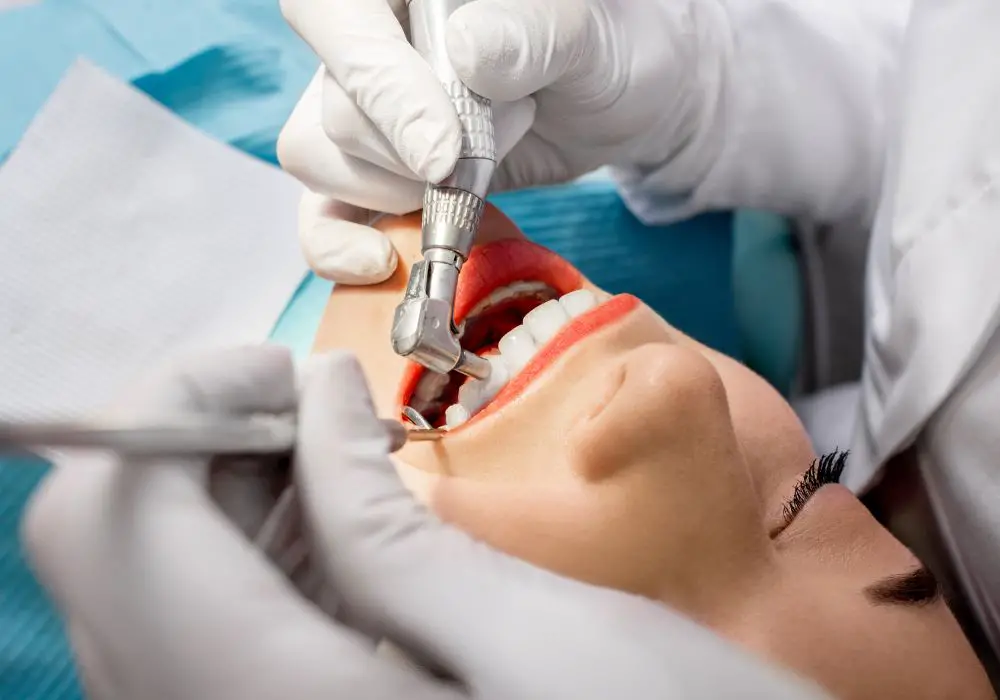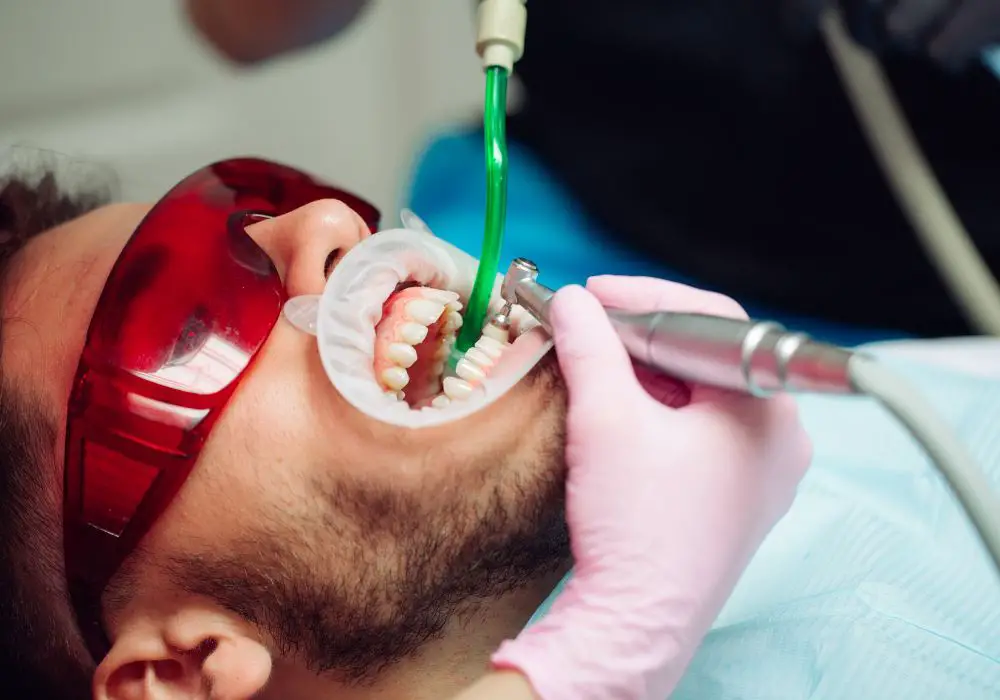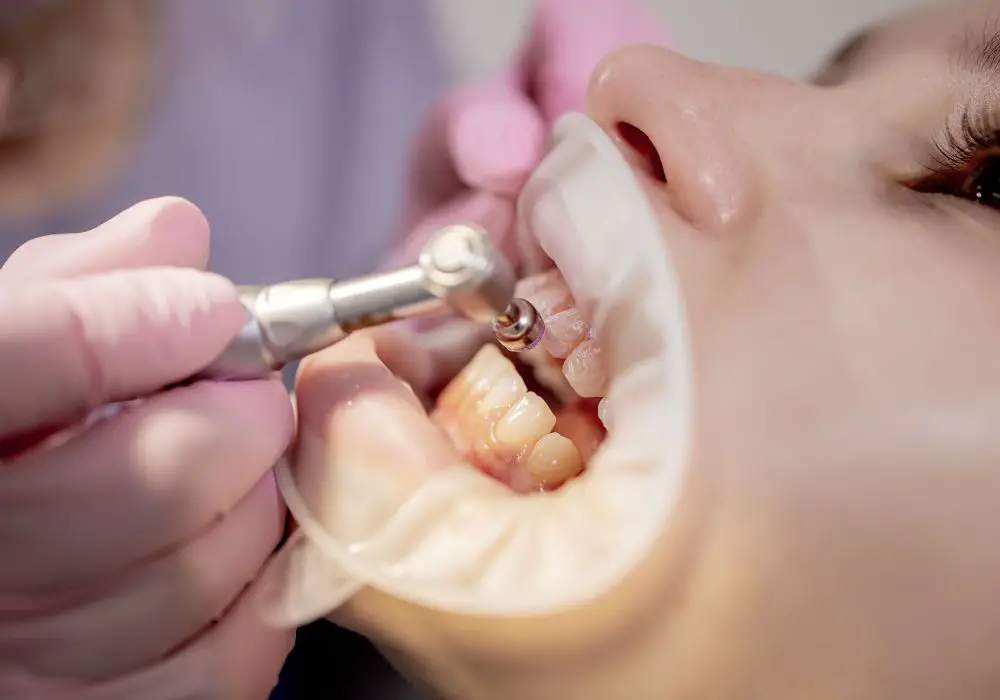Many people have experienced the strange fuzzy sensation in their teeth after a dental cleaning. While it may seem counterintuitive that your teeth would feel anything other than smooth and clean after a professional cleaning, there are a few reasons why this fuzzy feeling is actually quite common.
This article will explore the causes, implications, and solutions for fuzzy teeth after a dental cleaning. We’ll cover factors like plaque removal, gum irritation, sensory nerves, and remineralization. You’ll also find tips on how to get rid of the fuzzy feeling fast if it’s bothering you. Let’s dive in!
What Causes the Fuzzy Feeling?

There are a few primary causes of fuzzy teeth after a dental cleaning:
1. Plaque Removal
One of the main objectives of a professional dental cleaning is to remove the plaque and tartar that has accumulated on your teeth and around your gums. This buildup occurs when bacteria in your mouth form a sticky film on your teeth.
As the hygienist scales and polishes your teeth to remove this unhealthy buildup, it leaves tiny microscopic scratches on the enamel surface of your teeth. This roughened texture leaves your teeth feeling fuzzy or almost fuzzy.
2. Gum Irritation
The instruments used during dental cleanings can also sometimes irritate the soft tissues in your mouth, especially your gums. Your gums may end up feeling raw and sensitive after being scraped and prodded. This gum irritation magnifies the fuzzy sensation from the plaque removal.
3. Sensory Nerves
You have thousands of sensory nerves in your mouth that allow you to experience touch, temperature, pain, and more. When these nerves at the surface of your teeth are exposed from having plaque removed, you may feel increased sensitivity to textures and pressure. This can make your teeth feel fuzzy or abnormal.
4. Demineralization
The scraping and abrasion of the cleaning process removes minerals like calcium from the enamel surface of your teeth. This temporary demineralization makes your enamel softer and more porous immediately after the cleaning. As a result, your teeth may feel rougher and fuzzy.
Is the Fuzzy Feeling Bad?
For most people, the fuzzy tooth sensation after a dental cleaning is harmless and temporary. While the feeling may be annoying, know that it’s a sign your dental hygienist did a thorough job removing the buildup from your teeth.
That said, a persistently fuzzy feeling that lasts for more than 1-2 days may be a sign of dentin hypersensitivity. This occurs when the enamel wears away, exposing sensitive dentin underneath. Make an appointment with your dentist if the fuzzy sensitivity doesn’t subside or is painful.
How Long Does the Fuzzy Feeling Last?

Luckily, the fuzzy teeth feeling after a dental cleaning typically goes away within 24-48 hours. Here’s a general timeline:
- Immediately after: Teeth feel roughest and most sensitive due to swelling, nerve exposure, enamel demineralization, and more.
- 2-6 hours after: Sensitivity decreases as gums calm down and numbness wears off.
- 24 hours after: Most or all sensitivity resolves as exposed nerves heal and remineralization occurs.
- 48 hours after: Teeth return to feeling smooth and clean as the enamel surface recovers completely.
Again, if the fuzzy feeling persists longer than 2 days or transitions into painful sensitivity, consult your dentist.
Tips to Get Rid of the Fuzzy Feeling
Here are some tips to help your teeth recover faster after a dental cleaning and get rid of that annoying fuzzy sensation:
- Avoid acidic foods and drinks: Give your enamel a chance to remineralize by avoiding things like citrus, vinegar, carbonated drinks, and wine.
- Chew sugar-free gum: The extra saliva production will help neutralize acids and redeposit minerals.
- Brush gently: Aggressive brushing will prolong roughness and sensitivity. Use a soft brush and gentle motions.
- Use a desensitizing toothpaste: Look for active ingredients like stannous fluoride, potassium nitrate, or strontium chloride.
- Rinse with warm salt water: Soothe inflammation and keep your mouth clean while avoiding commercial mouthwashes with alcohol.
- Take OTC pain relievers: Ibuprofen or acetaminophen can temporarily reduce sensitivity.
- Get a fluoride treatment: Ask your dentist about an in-office fluoride varnish to accelerate remineralization.
- Wait to whiten: Whitening treatments will exacerbate sensitivity, so wait until your teeth feel normal again.
With a little bit of time and TLC, your teeth should be back to feeling smooth, clean, and fuzzy-free!

Frequently Asked Questions
Here are answers to some common questions about fuzzy teeth after dental cleanings:
Q: Why do my teeth hurt after a cleaning?
A: Mild tooth and gum pain after a cleaning is normal as your mouth recovers. The scraping and scrubbing can cause temporary inflammation and nerve irritation. Discomfort should resolve within a day or two.
Q: How can I stop the fuzzy feeling in my teeth?
A: Using desensitizing toothpaste, rinsing with warm saltwater, taking OTC pain meds, and avoiding acidic/hot foods can help calm the fuzzy sensitivity faster. It will subside on its own within 48 hours.
Q: Is it normal for teeth to feel rough after the hygienist?
A: Yes, it’s very common for teeth to feel rough and fuzzy after the scraping and abrasion of a dental cleaning. Tiny microscopic scratches in the enamel cause this temporary roughness that takes 1-2 days to fully heal.
Q: Should I be worried about permanant nerve damage?
A: It’s very rare for a routine dental cleaning to cause permanent nerve damage or loss of sensation. The fuzzy sensitivity is from temporary nerve irritation that will resolve as your mouth recovers. If numbness persists for many weeks, see a dentist.
Q: How soon after a cleaning can I whiten my teeth safely?
A: It’s best to wait at least 1-2 weeks after a dental cleaning before using whitening strips or getting a professional bleaching treatment. This allows your enamel to remineralize so sensitivity is minimized.
When to See Your Dentist
In most cases, the mild fuzzy sensation after a dental cleaning will fade in a day or two without any issues. However, schedule an appointment right away if you experience any of the following:
- Sensitivity or roughness that persists longer than 2-3 days
- Bleeding, swelling, or sores in your mouth
- Extreme temperature sensitivity that lingers for more than a week
- Pain strong enough to require medication
These symptoms could indicate an underlying dental problem that needs professional attention and treatment. Don’t delay getting it checked out.
Takeaways
While fuzzy teeth after a dental cleaning can be annoying, the sensation is normal and harmless for most people. Within 48 hours, your mouth will recover with rest, gentle care, and avoidance of sensitivity triggers. However, persistent or severe fuzzy feelings warrant a follow-up call with your dentist. With the right precautions, your teeth will be back to feeling freshly cleaned in no time.






